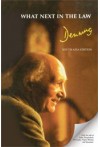- Author(s): Lord Denning
- Publisher: Oxford University Press
- Edition: South Asia Ed Rp 2020
- ISBN 13 9780199692170
- Approx. Pages 352 + contents
- Format Paperback
- Approx. Product Size 21 x 14 cms
- Delivery Time 3-5 working days (within Kerala & South India) (Others 7-9 days)
- Shipping Charge Extra (see Shopping Cart)
.............................................................................................................................
Description
In planning What Next in the Law, Lord Denning 'decided to look into the future and sel down some things - in the hope that they may perhaps be done by those who come after... I decided lo reach forth to the reform of the law in several branches where it is in most need of reform - and where there is, or should be - a reasonable prospect of it being achieved.' The book opens with the stones of great reformers of the past - Henry Bracton, Sir Edward Coke, Sir William Blackstone, William Murray and Lord Brougham. Subsequent sections of the book deal with details of proposals for reform in various areas of the law - trial by jury, legal aid, personal injuries, libel, privacy and confidence. Lord Denning then discusses proposals made throughout history, including his own ideas, for a Bill of Rights. Finally he treats the key issue of the misuse of power - a subject on which he is well known to have strong views. As in his other enormously successful books, Lord Denning draws from a wide range of sources to support his arguments, and incorporates coverage of many different cases, including that of the Russell baby, the Granada 'mole' and the case of Harriet Harman, all of which are selected on the grounds that 'the experience of the past points the way lo the future'. The book also discusses the proposals for law reform which have come from numerous Royal Commissions, Departmental Committees and Blue Books and which have as yet all been rejected by successive governments.
What Next in the Law will be of great interest, not only to lawyers and law students, but to all who are concerned with the future of the law, which 'affects the lives of all of us at some time or other.'
.............................................................................................................................
Contents
Part One
1. Henry Bracton C. 1200-1268
2. Sir Edward Coke 1552-1634
3. Sir William Blackstone 1723-1780
4. William Murray, afterwards Earl of Mansfield
5. Lord Brougham 1778-1868
Part Two
1. Its glories
2. Causes celebres 1367-1688
3. Causes Celebres in crime since 1770
4. Civil cases tried by jury
5. A glance backward
6. Reforms in my time
7. Proposals for Consideration
Part Three
1. Costs as they used to be
2. Side effects in old days
3. The coming of legal aid
4. Drawbacks of the scheme
5. Criminal legal aid
6. Proposal for Consideration
Part Four
1. The Royal Commission Report is shelved
2. Old days
3. Modern times
4. No- fault Liability
5. Damages for personal injuries
6. Living death
7. When the person is Killed
8. Loss of Future earnings
9. Pain and suffering and loss of amenities of life
Part Five
1. The star Chamber
2. The Common law takes over
3. The nineteenth century
4. The law takes a wrong turning
5. Technicalities beyond belief
6. Inordinate length
7. Fair information
8. Exemplary damages before 1964
9. Exemplary damages after 1964
10. Trial by jury-or by judge?
11. Legal aid
Part Six
1. Two human right in conflict
2. Our case - law
3. Breach of confidence
4. Confidentiality prevails
5. Confidentiality overruled
6. All about the ‘mole’
7. ‘The Primodos Affair’
8. Discovery of documents
9. Remedies for breach of Privacy or of confidence
10. The Future
Part Seven
1. Ever since Magna Carta
2. We come to our times
3. We turn to the cases
4. The Court at Strasbourg
5. Do not incorporate the Convention
6. Community Law
7. What should we do?
Part Eight
1. A hierarchy of power
2. Of rulers
3. Of honours
4. Convention of the Constitution
5. Parliament itself
6. Trade unions
7. Ministers of the Crown
8. Members of Parliments
9. The media
10. The judges themselves
Conclusion
Epilogue
Index
.............................................................................................................................
Author Details
Rt. Hon. Lord Denning, Master of the Rolls

